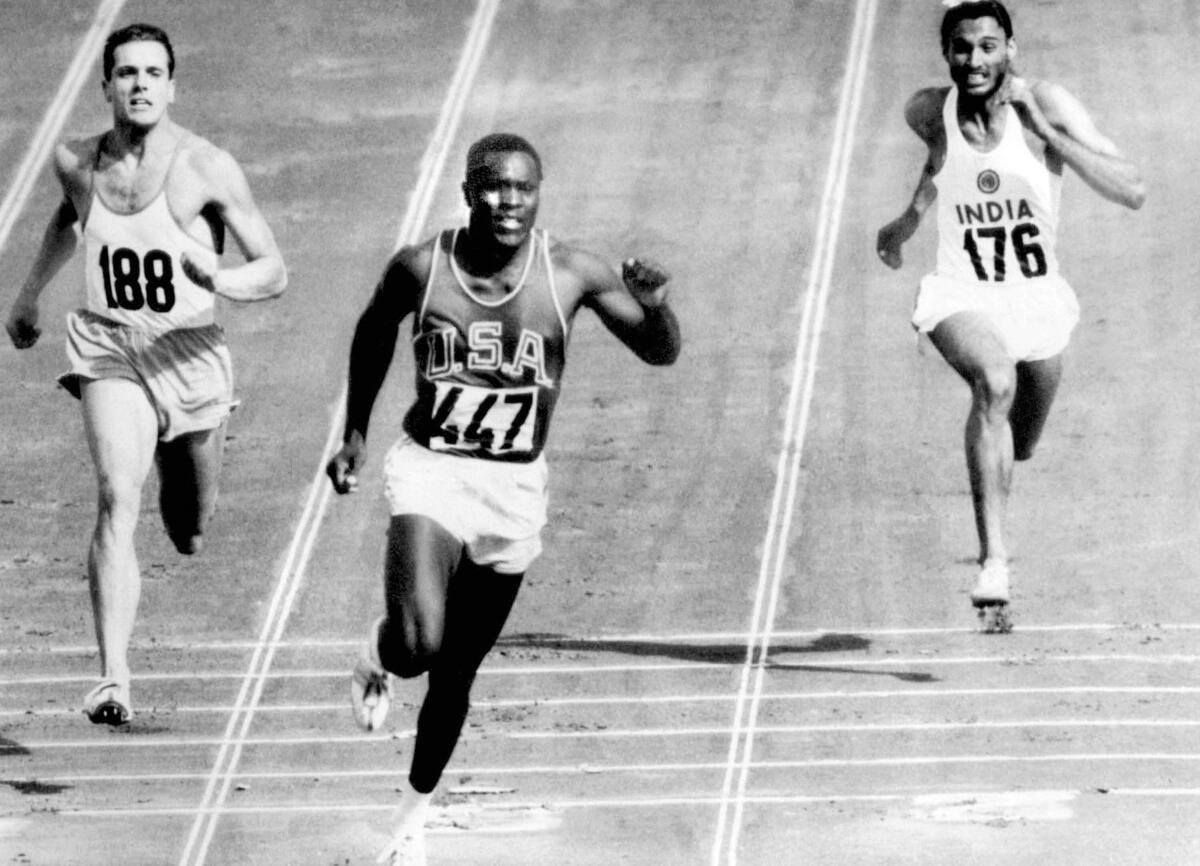At the Olympics, ‘the World Shrinks’

- Share via
When the Olympic torch begins its journey today from Los Angeles to Atlanta, I will be the first of hundreds of runners carrying it across the country. Even after 40 years of Olympic experiences--as a competitor, medalist, broadcaster, spectator and member of the L.A. Organizing Committee for the 1984 Games--it is still a thrill and an honor to participate. That’s because the Games themselves are more than the world’s greatest sporting spectacle. They are a powerful force for good.
In the coming months you will hear a lot about the brotherhood and sisterhood of athletes. You will be told that the Olympic movement has strengthened understanding among citizens of different nations. You will hear about friendships between people whose countries are at war. You will hear that the Olympics expand our awareness, making participants and spectators alike more global in their thinking, more emphatic toward other races, cultures and religions.
To our jaded modern ears, it might sound like a bunch of corny cliches. To me, it’s simple truth.
In my experience, the Olympics get us to think of other parts of the world not as strange names in an Atlas or outlines on a map, but as places that real humans call home. The world shrinks when land masses take on the faces of people.
For me, England was the land of Dickens and Shakespeare, of Big Ben and kidney pie and Buckingham Palace. Thanks to the Olympics, it became the home of my friend, Gerald Carr, the discus thrower. Ceylon was a small island off the coast of India. As far as I was concerned, it might as well have been on Mars. After the 1956 Olympics it was embodied by the high jumper Nagalingam Ethirveerasingam. Later, when Ceylon became Sri Lanka, I understood what had happened in that remote nation because I had gotten to know Nagalingam.
Next month I will tell a tour group in Greece how important the Olympics were to the ancients, how they glorified athletes and even halted wars so that people could travel peacefully to the games. Those facts I could have learned in a book; I will also talk about things I would never have known if I had not become friends with a Greek pole vaulter named George Robanis.
Every time international tension has erupted over the relationship between China and Taiwan, I viewed the situation not just through newspaper reports but through C.K. Yang, the Taiwanese decathlon star, C.K. and I trained together at UCLA, battled one another fiercely in the 1960 Olympics in Rome and remained close friends ever since.
At the height of the Cold war, my chief rival was Vassily Kuznetsov of the Soviet Union. At the Olympics, Vassily was watched closely by Soviet officials and his living quarters were off limits to visitors, but we spent enough time together to develop mutual affection and respect. The stereotypes we harbored about each other’s nations shattered like the decathlon records he and I kept breaking.
Next to winning the gold medal, the athletic memory I hold most dear is of the first-ever dual track meet between the U.S. and Soviet Union, in Moscow. When I beat Vassily, I was suddenly engulfed by hundreds of his fans. Terrified, I thought I was being attacked, like a soldier who had wandered into enemy territory. Instead, I was lifted onto Russian shoulders and carried around the stadium to enormous cheers. This astonishing display of sportsmanship occurred only because my friendship with Vassily had been reported in the Soviet press, and because Vassily himself led the charge.
Through international competition I realized that enormous power can be generated when people with disparate backgrounds and interests get together for a common purpose. Since then, I’ve seen that same kind of dynamic diversity work magic in business, charitable organizations and community projects It creates a kind of alchemy that not only changes individual perception but enhances creativity and innovation as well.
In this time of polarization and enmity within our own borders, we can use a dose of Olympic medicine. We all need to get out of our own little territories--not just physically but mentally and emotionally--to see how our fellow citizens think and feel. I wish it were as easy to bring together Americans of different backgrounds as it is to gather athletes from around the world.
The Olympic motto is “Citius, Altius, Fortius”--Swifter, Higher, Stronger. I like to think the words apply to more than just athletic prowess. Perhaps the Atlanta Games will inspire us to build the kind of community whose torch we would be proud to pass to our children.
More to Read
Go beyond the scoreboard
Get the latest on L.A.'s teams in the daily Sports Report newsletter.
You may occasionally receive promotional content from the Los Angeles Times.






